The amazing tale of Dominique… Why has she been living in New Zealand for 29 years?
Visit the photo gallery :Dominique
Dominique Davaux has been living in New Zealand for 29 years, with John, her Australian husband. I am interviewing her in the living-room, drinking some herbal tea (meadowsweet plants from her garden that taste amazing). John, who speaks a little bit French, is leaving after a little while because he has some work to do in the garden, and doesn’t want to disturb us. She takes time to tell me her stories and is looking for some French words that have ended to be hidden somewhere in her memory. I have been living at their own place during this photo reportage and came back from it feeling like «new»!
Where about are you from?
I am from Vert-Galant, near Paris.
Why have you decided to leave France?
Because I’ve met John! He came in France through a French friend that he met in India, who told him to come to visit him. I was in a small village in the Tarn and Garonne area, where his friend was living too.
Have you already had the opportunity to live abroad before?
No. And I had no intention to emmigrate; I didn’t know that I was a migrant. And I didn’t know at all whereabout was Australia and even less New Zealand! In the plane, during our first travel, on the stop-over in the Philippines, where it was stiflingly hot, I thought «but where are we going like that? Aren’t we arrived yet? ». Ahlala… naivety! If I would have known I wouldn’t have done it. It was total wrecklesssness.
Why New Zealand?
It’s total random! We arrived here in 1980. We had been living for a year in Melbourne before, but John had enough. Before that he had been travelling a lot through Asia, and couldn’t stand living in this big city. The gap between what he had experienced before all along those travels before he arrived in France, and Melbourne was too big. So we started to travel with a big car and a tent from there to the north of Australia, following the east coast, and also a little bit in the outback. In Cairns we met Sheila, an American and John Hayes, an Englishman. They were travelling in a campervan and showed us a photo album, where there was some building works that John Hayes had been doing, including a meditation hall in a Buddhist community in the bush, in the north of Sydney. Just on the page nearby was a picture of a small house, and we asked about it. They answered that it was their house in New Zealand, where they had been living for 3 years but they didn’t want to live there anymore, they wanted to sell it. Then John said: «A house in the country, why not!». So they made the transaction with a New Zealand solicitor that Sheila and John knew.
You hadn’t even seen the house?
No, just few photos! And we spent some time camping with this couple (we didn’t want to loose contact while the transaction was taking place in Waimate!). We visited some amazing parts of Queensland together. In October 1981 we went to NZ. Once in Christchurch we first thought that it was horrible !
In Melbourne John was working as a roof layer and I was taking care of the baby, our first one, a little girl, Arwen. To me, living in Melbourne was like coming back to the past: I was living in Paris until I was 23, then I escaped Paris and went to live in la Baule with my first partner and then in the Lot-et-Garonne and in the Tarn-and-Garonne, where I learned gardening. In Paris I
saw everything in black. I was working in a library, where we had to clean all the books. All this dust accumulated throughout the years… And this constent noise… But once I arrived here some things were missing: exhibitions, good movies, stone villages, talking with people… But in Melbourne it was actually different, not at all like Paris: the CBD is quite small, although there are many skyscrapers. Around that there are suburbs. So we needed a car, whereas in Paris I was walking everywhere. In Melbourne, avenues seemed so huge, very wide, I couldn’t walk everywhere! Although I saw many different cultures: for instance the chinese area, the turc, greek, italian, spanish, portuguese, vietnamese ones. It is a very dynamic city with lots of good food, if you know where about to get it.
So once we arrived in Christchurch we thought that there was nothing in comparison! It was a cultural and gastronomical desert! When we took the bus on the National 1, which was at this time empty: it was all straight, the road, the railwayline, electric lines and poles, and shelter belts of macrocarpa trees. We started to wonder what have we done??
But we found that people were so kind, lovely, helpful… We had contacts from Sheila and John, who told their friends that we were coming. We even spent our first night at the lawyer’s house, with his family. They all came the day after with brooms, vacuum cleaner, cloths and buckets to clean the house. It was in Morven. It was a settlement near the train station. In the early 20th century it was a dynamic village with a grocery, a butchery, a bakery, a tea room (a cafe where people could drink a tea or coffee and eat a sandwich while they were waiting for their train to arrive). But when we arrived there was already nothing left. Thanks to all the friends of John and Sheila, so kind, we thought that it was finally not that bad. They asked an electrician to come to restart everything because the water supply was working with a pump. And that’s it, little by little…
In April 1982 I came back in France for 5 months, 2 years after I had gone. I was hoping to find something that could make me stay, but no, there wasn’t anything! Of course it was great to see everybody again, but I found odd that there wasn’t really any
opportunity that could have made me stay… There was nothing at all, so I came back. But it allowed me to escape the fisrt winter here, while John was freezing, working for a farmer.
Then we wanted to buy our own property, and not only a quarter acre! We wanted more land. We didn’t want to stay in this area because there was too much to restaure in this house that wasn’t really well done (no toilet, too rustic!). In Waimate there are a few hills, it’s nicer, but Morven is very flat. So we went travelling all around New Zealand. It was in March 1983, it was raining a lot on the West Coast so we went to Nelson and Motueka then from the South Island to the North Island. We were going from a Real Estate Agent to another to visit houses. We saw some wonderful places but without finding our property, with the idea to make our organic farm. At this period there was speculation around land for kiwi fruits so it was very expensive. We didn’t find anything during our big road trip, so we came back.
Then our son Raphaël was born. Eventually in 1984, the lawyer that had helped us to buy our house from Australia found for us
a 15 acres block of land in Morven, where it is quite flat, but at least not too expensive! My parents came at Xmas 1985 when John was still building our new house, but that was their first and last trip to New Zealand because they found it too far away, they felt the journey was too long.
Once we moved in we had a flood, 13th March 1986. The flood bank along the river broke. It happened in our new house, while we were still unpacking. It took us several months to repair everything, and we had two small children, it was hard. Once that was done, we started our bio-dynamic business, but we needed a temporary organic certification. Once a year we had a visit from the bio-dynamic inspector who also gave us advice. Our neighbours, born and bred here helped us a lot as well; they taught us what we couldn’t learn from books. At the beginning it didn’t work really well, organic shops didn’t exist at this time and there were only a few cooperatives. The trucking system didn’t help either. But little by little laws were evolving and so delivery courier companies were allowed and started to be cheaper. First we mainly had vegetables. Some of these, people didn’t know, such as celeriac, lamb’s lettuce, Florence fennel, scalopinis. People’s diet was not varied in those days. We were also growing some Chinese and Japanese plants such as daikon radish, mizuna and giant red mustard. We had to «educate» people. I was sending recipes. And little by little people were trying everything. But carrots remained our main sale.
Then organics shops started to open everywhere and we also had a box system sent to individual customers living in isolated places. For those customers I was also trading Demeter or Bio-Gro fruits or vegetables that we couldn’t plant ourselves (like
avocadoes and oranges) because of the climate. But we were trying not to spend too much energy with transports.
Along the years we also hosted several field-days or seminars on Organic methods, on Bio-Dynamics or Permaculture or maybe we had local gardening groups visiting. We had students from the organic course of the Christchurch Polytech coming on their work experience.
Was it only both of you to do all of that?
At first, yes. Then we had an employee 2 to 3 days per week. She even looked after the place when we had to go to France or Melbourne.
We stopped the organic business and sold the property in 2004, which makes it exactely 20 years, because we could feel that it would be difficult to switch to a new type of occupation. We wanted the property to keep its value, to stay clean and nice. So we couldn’t really stay living there without the business. To take care of this kind of property costs quite a lot. For example after 15 years we had to cut the trees that took too much space or were giving too much shadow. Arborists are expensive! We had planted our trees according to permaculture books, but reallity is different! We used a scrub-cutter around the gardens and mowed around the ornamental trees; we actually used quite a lot of petrol. So we didn’t want to carry on like this, we thought that it was the right time to stop. We still wanted to cultivate our own garden, but somewhere smaller. But once again the property market was inflated. In two months, between March and May 2004, prices went up incredibly high. So we had to rent a house on a farm for 3 years while we searched for a small block of land. We wanted to create a Bed & Breakfast, with a large garden and orchard still using biodynamic methods. We even made the house plans and the map of the landscaping. And John could have given yoga and massage classes. But we never found the right place in the right location; maybe we were too fussy and difficult. Finally we decided to buy this house, in the town of Waimate where we are today, smaller with less land. It is the first time that we live in a town since Melbourne in 1980/81.
Children were gone then?
Yes, during her last year of secondary education our daughter left for 11 months to France with a high school program, and then in 1997 when she came back she went to study and work in Dunedin. Our son went to study in Nelson in 2001.
And are they now living in Europe ?
Our daughter left in 2001 and never came back. I thought she would go to France because when she came back her level of French was quite good, but not enough to get her baccalaureat (equivalent to e-level). But in France it is quite complex, so she went to England, where it is easier to find a job, and even easier than here. It is easier about your level of studies and your diplomas, they trust you more. Also you can evolve in the companies quite quickly. She met an Englishman from Cambridge and so she stayed in Cambridge.
And our son has travelled a bit. He went to work in Melbourne and spent time with John’s family. Then he left to work in England from 2008 to 2010 with his New Zealander girl friend. They visited Morocco, Venice, Prague, Vienna, Rome and of course Paris and my mother’s town in the South-West. He has a French passeport, through me, an Aussi one through John, and
a Kiwi one, because he was born here, in Timaru. So he could have stayed longer, but his girl friend couldn’t stay longer than 2 years with her New Zealand visa.
So he can get three passports?
Yes, but it’s interesting to see that John, as an Aussie, can’t have any other nationality. He can’t have any other passport, whereas for children it’s possible to have Australian citizenship by descent as well as their original citizenship.
And you?
I made the application for a New Zealand citizenship in 2006. It took me a while (laughing)! 1981 to 2006! People were actually surprised to discover that I had not done earlier. It was a very official ceremony in the town hall with the mayor in full regalia. We had to swear on a bible and read the allegiance to the Queen. We received a certificate and a gift of an alpine totara tree.
But are you still French?
Yes and I am travelling on my French passport.
There are some countries, such as the United States for which it would be easier to travel with your New Zealand passport, according to some agreements…
Oh yes! Indeed this is true. But anyway, we are going only to France, England and Australia.
For Australia, as French I need to apply for a tourist visa whereas if I had a New Zealand passport I would not need it.
And when you first arrived here which were your possibilities to work here?
I was trained as a librarian in Paris but my English was still not good enough to work in this field here. So I became self-employed and helped John. I had the Australian residency, then the N.Z. residency. But when we wanted to buy the property we needed an authorisation from the Department of Internal Affairs in Wellington, at that time. Maybe it’s going to be
like that again soon because there are more and more foreigners and companies who want to buy land in New Zealand, maybe too many. In 1983 we needed authorisations.
How do you feel about your emigration?
Pffff… It’s too far away!
The worse was in 1984 when the Rainbow Warrior bombing occured. People in this district were just saying lots of jokes, but we know a French guy who had serious trouble in Christchurch. French people suddenly had a bad reputation and French products were boycotted. Plus one of the three responsible agents’ name was Dominique (Prieur)!
Our only long trips to France were in 1990 and 1998. It was for 4 to 5 months, to get enough time to visit all the family and old friends, to get used to the culture and language again, to have enough time to enjoy it, the way of life and all. But in 2003, 2007 and 2010 we could not stay in France for more than 5/7 weeks and we thought that it was really too short for the expense.
What are you missing from France?
Now I am ok, I’m a hybrid. Now I know New Zealand and its history better. But I still miss nice villages, castles, the remnants of Greco-Roman or even older architecture, exhibitions, the language (apart French from Paris because I don’t like its accent, but I really like the one from the south west of France for example). I was good at French and French literature at School so it was quite a grief not to have this anymore. I realised that I was identified by all these things and had to slowly reinvent myself, I suppose. About food it’s ok because we can find good bread now, croissants, good olive oil, but when we first arrived… no! Wine was expensive and imported. But New Zeland has changed a lot which makes things easier. But there is still not much history…
And family?
Yes it has become difficult, especially with my mum who is getting old and and who can hardly move now… Also I have never
really known my nephews, or the opposite: they have never really known me. And I’ve missed it a lot. If we would have lived in France our children could have gone on holidays together for example. My sister has four boys but they have never come here.
Last time we were in Paris, for the first time one of my nephews suggested he might come over. But he has already gone to Japan, so he is more into travelling than the others.
This year we have met a young French student in organic husbandry, Pierre. And he had an internship period in the Lot-et-Garonne, where I was living for some time and he knew some people that I knew in 1977. And randomely we’ve met here. Pierre was really amazed by the coincidence, well me too. He stayed in New Zealand for a year and with us here for a week and is leaving soon. He had 3 or 4 people that came to visit him! He is the same age as our son and we have developped the same kind of relationship as auntie/uncle to nephew.
Also nowadays communication has improved a lot, with Skype we can talk with the family, it isn’t less frustrating than it used to be?
Yes, for us when we were travelling in Australia in 1980/81 the only way to communicate with our parents was to send mails to poste restante, and we had to tell on every letter where we would be next to get the answer in another city!
What have you kept from your national identity?
I’m wondering! I should ask our friends!
Probably some expressions and interjections and a bit of an accent.
While I was talking with a Japanese friend I also realised that my vision of the world is very «eurocentrical», whereas his is «asiacentrical». When he is talking about learning more about his neighbours he would talk about Malaysia for example.
Whereas I see everything from the Western Europe point of view.
How do you feel integrated about the langage?
About that I do, now. But for a long time I had trouble with the accent (stress accent), and it still happens sometimes nowadays. For years I hated the glazed stare of people who wouldn’t understand me.
How long did it take you to really feel well-at-ease?
15 years at least! And before I could feel totally bilingual 20 years! And I was good at English in High School, it was my favourite subject.
How do you feel integrated with politics?
Well, I am a member of the green party, I have always been part of the ecologist movement, but while I was living in France there wasn’t any green party. Here this party gathers always at least 7% of the votes, here it’s the third party.
How do feel integrated to the life here?
Good, I am part of a gardening association. I don’t really like how it works: with a president, a secretary, a treasurer. Meetings can be formal. But we know lots of people now in the district. That is the advantage of the fact that we haven’t moved too much.
We have some american friends that have been moving so much that we are wondering how they can get roots and know some people really well? I like the fact that I know how to find help easily to resolve any problem, for example.
How do you feel involved in New Zealand traditions?
I find them less colourful. But I assume that it’s the same everywhere. Because of urbanisation traditions get lost, it’s less and less colourful everywhere…
For example?
Public parties, such as balls. Like the 14th of July (National Bastille day) street balls doesn’t exist here. And all that come from religions. I think that a lot of things got lost while pioneers travelled by sailing ships, because it took at least 3 months by boat, and then they were isolated from their original civilisation.
However there are architectural buildings here which kept British style.
There are also the traditional Fish & chips on Friday evenings, pubs, but I don’t like pubs!
When we first arrived there were no cafes but since about 10 years lots of them have opened.
Have you ever felt any kind of discrimination?
I have been affected by the Rainbow Warrior (Green Peace) drama.
As long as we were self-employed it was all right but when I’ve tried to find a job it has been much more difficult.
My name on my resume -Davaux, I’ve kept my maiden name-, that nobody can pronounce was wrong. When I had to fill in forms about my studies I couldn’t find any equivalence and nobody knew my schools, so people didn’t consider that I had a diploma.
Do you live surounded by French people?
No!
And other foreigners?
Yes, our friends are often foreigners (Americans, Canadians, English, Deutch), or people who have travelled a lot. We tend to hang out with people who have been working in the organic//biodynamic field or who are doing yoga, or who are artists.
Locals?
Yes, a few, neighbours…
Do you have the project to come back to live in France?
Sometimes we think that «yes»! But because John has his mother who is living in Melbourne, 3 hours by plane only, we couldn’t leave, she wouldn’t understand. We are used to live here now. In France it wouldn’t be easy either because I am not sure that John could have the residency to live over there. But after the big flood we had in March 1986 and with this cold wind from the
south, the sharp breeze from the east, I was thinking that living in France would maybe be better! But we don’t really want to start all over again in Australia either. At least here we don’t have any fire risks like in Victoria.
Do you feel more French or world citizen?
Maybe both… It’s difficult to answer.
Why have you asked for the kiwi nationality?
Just in case, because for some time there was lots of movement against foreigners. Also, as I am now closer to retirement than when I arrived here in Waimate I was scared that laws on retirement pension would change for foreigners.
How often do you go back to France?
The first time was in 1982, 2 years after I left from France, then 8 years later in 1990 (with the children), but it was too long. So many things had changed, even the language! And then 8 years later again (just with our son Raphaël), which was again too
long! My family had changed too. My grand-mother had died in between. My father was very ill. I had lost touch with good friends. And then it was 5 years later in 2003, which was a better time frame. Then 4 years later, we did an effort for my mother 80’s. And then 2 years later, this year 2010 (because our daughter had twins in Cambridge) which was better, it was closer. But the problem is the cost.
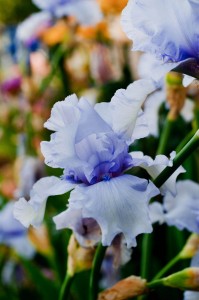
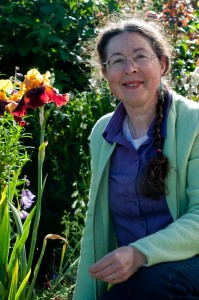
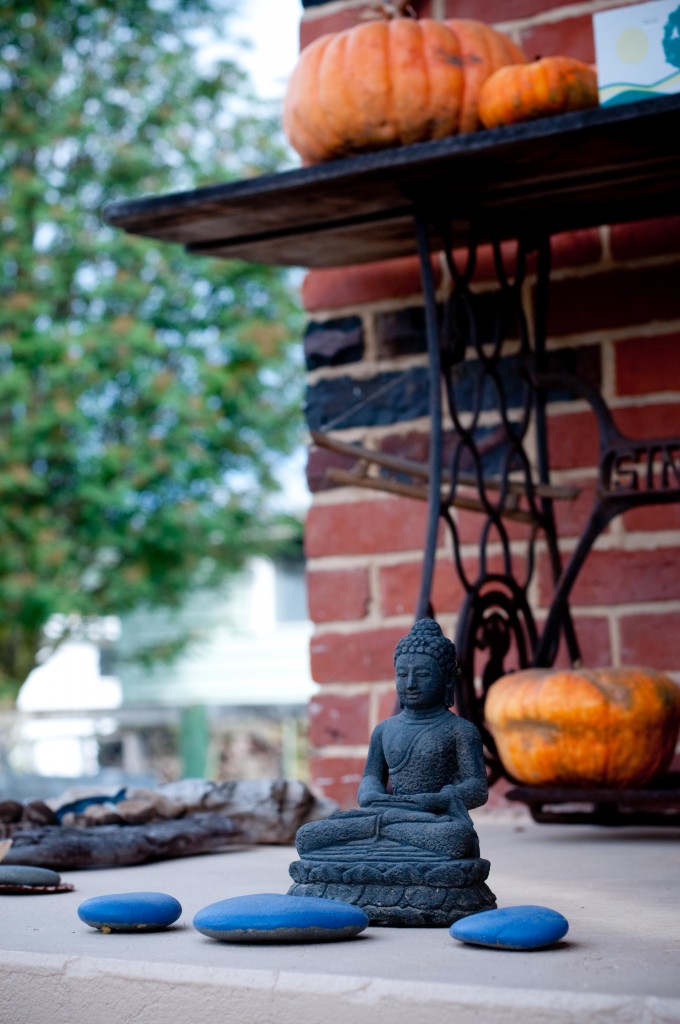
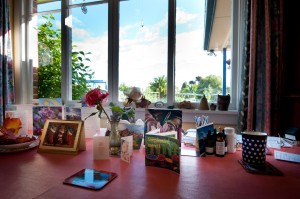
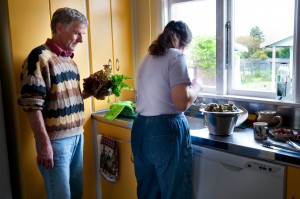
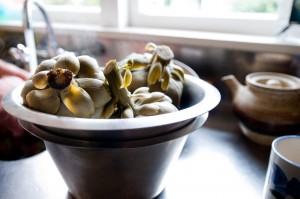
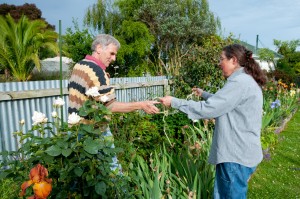
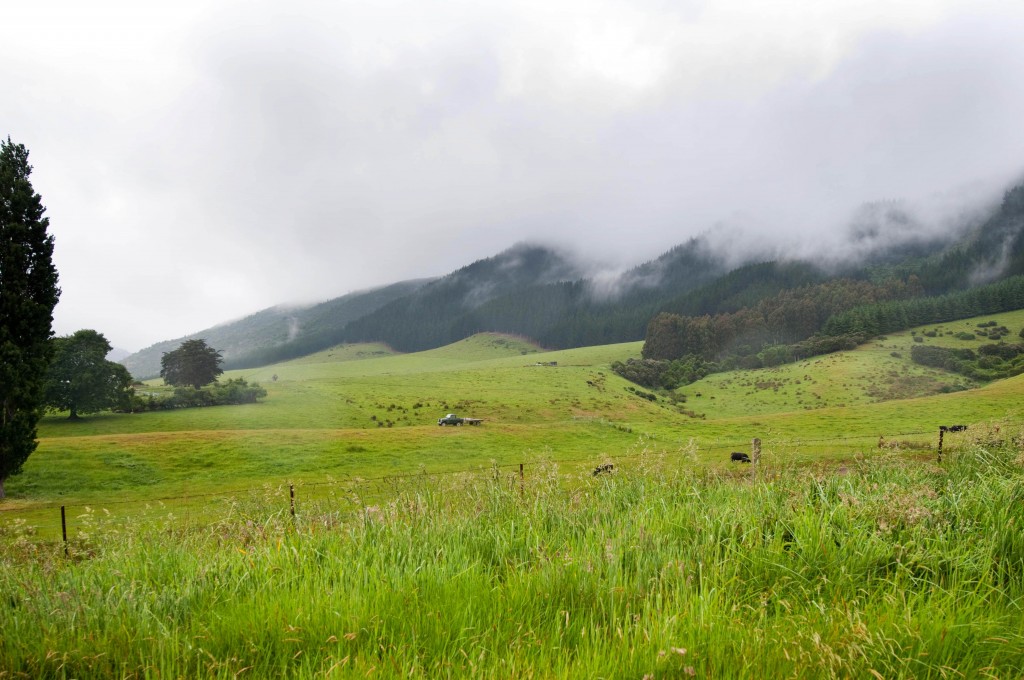
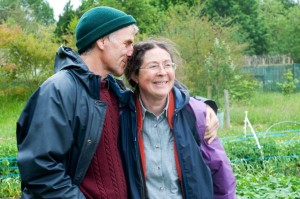
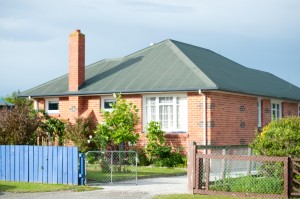
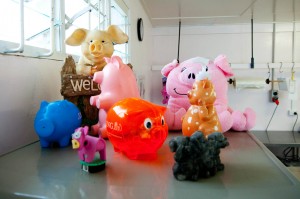
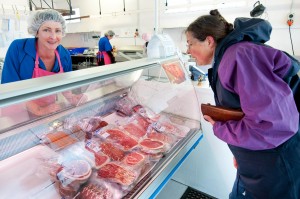
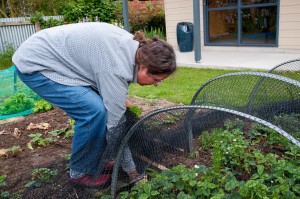
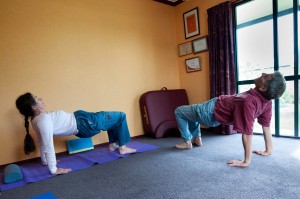
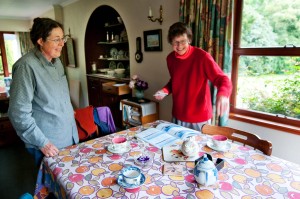
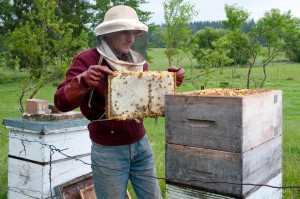
 English
English Français
Français